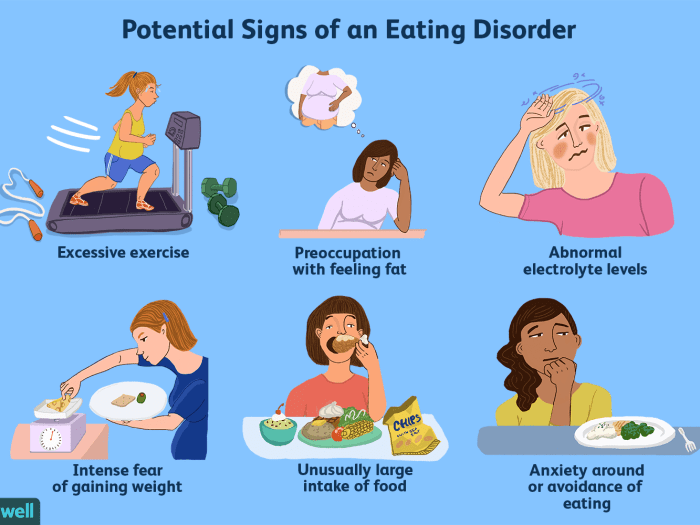Characteristics of anorexia nervosa include all of the following except: an eating disorder characterized by an intense fear of gaining weight, a distorted body image, and severe food restriction. It is a serious mental illness that can have life-threatening consequences if left untreated.
The exact cause of anorexia nervosa is unknown, but it is thought to be caused by a combination of genetic, psychological, and environmental factors. People with anorexia nervosa often have a distorted body image, meaning they see themselves as overweight even when they are dangerously underweight.
They may also have an intense fear of gaining weight, which can lead to severe food restriction.
Prevalence of Anorexia Nervosa

Anorexia nervosa is a severe eating disorder characterized by an intense fear of gaining weight, a distorted body image, and severe food restriction. It is a complex mental illness that affects individuals of all ages, genders, and socioeconomic backgrounds.
The prevalence of anorexia nervosa varies across different populations. According to the National Eating Disorders Association (NEDA), approximately 0.9% of the U.S. population will develop anorexia nervosa in their lifetime. However, the prevalence is higher among certain groups, such as adolescent girls and young women.
Factors Contributing to Anorexia Nervosa
The development of anorexia nervosa is influenced by a combination of biological, psychological, and social factors. These factors include:
- Biological factors:Genetics, brain chemistry, and hormonal imbalances may play a role in the development of anorexia nervosa.
- Psychological factors:Individuals with anorexia nervosa often have a negative body image, low self-esteem, and a perfectionistic personality.
- Social factors:Cultural pressures to be thin, exposure to dieting and weight loss messages, and a history of trauma or abuse can contribute to the development of anorexia nervosa.
Populations Most at Risk for Anorexia Nervosa
Anorexia nervosa is most commonly diagnosed in adolescent girls and young women. However, it can also affect boys and men, as well as individuals of all ages.
Certain populations are at a higher risk for developing anorexia nervosa, including:
- Individuals with a family history of eating disorders
- Individuals who are involved in sports or activities that emphasize thinness, such as ballet or gymnastics
- Individuals who have experienced trauma or abuse
- Individuals who have a history of dieting or weight loss attempts
Symptoms of Anorexia Nervosa
Anorexia nervosa is characterized by a triad of symptoms: severe food restriction, an intense fear of gaining weight, and a distorted body image.
Physical Symptoms
- Extreme weight loss
- Malnutrition
- Amenorrhea (loss of menstrual periods in women)
- Dry skin and hair
- Brittle nails
- Constipation
- Electrolyte imbalances
- Heart problems
- Kidney problems
- Bone loss
Psychological Symptoms
- Intense fear of gaining weight
- Distorted body image
- Low self-esteem
- Perfectionism
- Anxiety
- Depression
- Obsessive-compulsive disorder (OCD)
Behavioral Symptoms
- Severe food restriction
- Excessive exercise
- Purging behaviors (such as vomiting or using laxatives)
- Withdrawal from social activities
- Isolation
- Self-harm
Diagnosis of Anorexia Nervosa
The diagnosis of anorexia nervosa is based on a physical examination, a psychological evaluation, and a review of the individual’s medical history.
Diagnostic Criteria
According to the Diagnostic and Statistical Manual of Mental Disorders, Fifth Edition (DSM-5), the diagnostic criteria for anorexia nervosa include:
- Restriction of energy intake relative to requirements, leading to a significantly low body weight in the context of age, sex, developmental trajectory, and physical health.
- Intense fear of gaining weight or becoming fat, even though underweight.
- Disturbance in the way in which one’s body weight or shape is experienced, undue influence of body weight or shape on self-evaluation, or persistent lack of recognition of the seriousness of the current low body weight.
Role of a Healthcare Professional
A healthcare professional, such as a doctor or psychiatrist, can diagnose anorexia nervosa. The healthcare professional will perform a physical examination, ask about the individual’s eating habits and weight history, and conduct a psychological evaluation.
Importance of Early Diagnosis and Treatment
Early diagnosis and treatment of anorexia nervosa is essential to improve the individual’s chances of recovery. Anorexia nervosa is a serious eating disorder that can lead to life-threatening complications if left untreated.
Treatment of Anorexia Nervosa

The treatment of anorexia nervosa involves a multidisciplinary approach that includes medical care, psychotherapy, and nutritional counseling.
Types of Treatment
- Medical care:Medical care focuses on addressing the physical complications of anorexia nervosa, such as malnutrition, electrolyte imbalances, and heart problems.
- Psychotherapy:Psychotherapy helps individuals with anorexia nervosa to understand the underlying causes of their eating disorder and to develop healthier coping mechanisms.
- Nutritional counseling:Nutritional counseling helps individuals with anorexia nervosa to develop healthy eating habits and to gain weight safely.
Goals of Treatment
The goals of treatment for anorexia nervosa include:
- Restoring the individual to a healthy weight
- Addressing the underlying psychological issues that contribute to the eating disorder
- Preventing relapse
Importance of a Multidisciplinary Approach
A multidisciplinary approach to treatment is essential for the successful treatment of anorexia nervosa. This approach allows for the individual to receive the comprehensive care that they need to recover from their eating disorder.
Prognosis of Anorexia Nervosa: Characteristics Of Anorexia Nervosa Include All Of The Following Except:

The prognosis for anorexia nervosa varies depending on the severity of the eating disorder and the individual’s response to treatment.
Statistics on Prognosis
- Approximately 50% of individuals with anorexia nervosa make a full recovery.
- Approximately 30% of individuals with anorexia nervosa experience a partial recovery.
- Approximately 20% of individuals with anorexia nervosa do not respond to treatment and continue to experience symptoms of the eating disorder.
Factors Affecting Prognosis, Characteristics of anorexia nervosa include all of the following except:
Factors that affect the prognosis of anorexia nervosa include:
- The severity of the eating disorder
- The individual’s response to treatment
- The presence of comorbid mental health conditions
- The individual’s support system
Resources for Individuals with Anorexia Nervosa
There are a number of resources available to support individuals with anorexia nervosa, including:
- The National Eating Disorders Association (NEDA): NEDA provides information and support to individuals with eating disorders and their families.
- The Eating Recovery Center: The Eating Recovery Center provides a range of treatment programs for individuals with eating disorders.
- The National Association of Anorexia Nervosa and Associated Disorders (ANAD): ANAD provides support and information to individuals with anorexia nervosa and their families.
Q&A
What are the symptoms of anorexia nervosa?
The symptoms of anorexia nervosa include: – Severe food restriction – Intense fear of gaining weight – Distorted body image – Amenorrhea (loss of menstrual periods) – Dry skin and hair – Brittle nails – Constipation – Fatigue – Dizziness – Lightheadedness – Fainting
What are the causes of anorexia nervosa?
The exact cause of anorexia nervosa is unknown, but it is thought to be caused by a combination of genetic, psychological, and environmental factors.
How is anorexia nervosa treated?
Anorexia nervosa is treated with a combination of psychotherapy, nutritional counseling, and medical care. The goal of treatment is to help the person with anorexia nervosa to gain weight, improve their body image, and develop healthy eating habits.